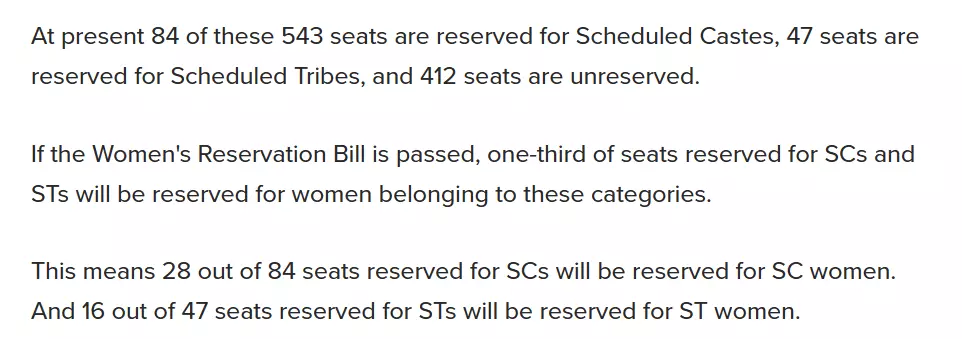Under the leadership of Prime Minister Narendra Modi, India achieved a historic milestone by earmarking 33 percent of Lok Sabha and state assembly seats for women through the Women Reservation Bill, also known as the 108th Amendment. This landmark legislation received resounding approval from both the Lok Sabha and Rajya Sabha, marking a significant departure from a decade ago when the Congress government’s attempt to pass a similar bill faced opposition from its own allies, ultimately betraying the women of the nation.
However, after a decade, opposition parties, albeit with some reluctance, rallied behind the bill, which was a rare instance of unanimous support for Prime Minister Modi. This unanimity has caused consternation among opposition members, leading them to raise the issue of reserving seats for Other Backward Castes (OBC) women within the broader framework of women’s reservation. The narrative surrounding this “reservation within reservation” concept has been propagated by the opposition through various media outlets and online platforms.
Renowned for its inclination toward left-leaning journalism, The Quint released an article delving into the intricacies of the Women’s Reservation Bill. In this report, The Quint’s narrative contains certain factual inaccuracies, which we aim to identify and subsequently unveil the actual facts behind the claims made in the publication.
Here is an excerpt from The Quint’s article, “ At present 84 of these 543 seats are reserved for Scheduled Castes, 47 seats are reserved for Scheduled Tribes, and 412 seats are unreserved.
If the Women’s Reservation Bill is passed, one-third of seats reserved for SCs and STs will be reserved for women belonging to these categories.
This means 28 out of 84 seats reserved for SCs will be reserved for SC women. And 16 out of 47 seats reserved for STs will be reserved for ST women.
Remaining 137 seats will be reserved for general category women whereas 275 seats will be unreserved.”

This story was tweeted by Quint Journalist, Himanshi Dahiya. She tweeted, “ Will ‘upper caste’ women be the biggest beneficiaries of the Women Reservation Bill? At least a category-wise breakup of the numbers in Lok Sabha says so.”
Fact Check
We embarked on our investigation by reading the original bill passed in the parliament. The bill reads, “As nearly as may be, one-third (including the number of seats reserved for women belonging to the Scheduled Castes and the Scheduled Tribes) of the total number of seats to be filled by direct election in the Legislative Assembly of every State shall be reserved for women and such seats may be allotted by rotation to different constituencies in that State in such manner, as Parliament may by law determine.”

To put it simply, around one-third of the seats in every State’s Legislative Assembly, including those reserved for women from Scheduled Castes and Scheduled Tribes, must be set aside for women. These seats will be rotated among various constituencies in the state, as specified by laws passed by the Parliament.
Furthermore, in our pursuit of gaining a more comprehensive comprehension of the intricate details embedded within the Women Reservation Bill, we sought news articles from widely recognized and established mainstream media sources.
According to the Hindu, “ The Bill proposes 33 per cent reservation for women in Lok Sabha and Assemblies of State and National Capital Territory of Delhi. Similar reservation will also be provided within the seats reserved for SC and ST. The Bill proposes that the reservation will continue for 15 years. Seats reserved for women will be rotated after each delimitation exercise.”

The Bill suggests that 33 percent of seats in the Lok Sabha, State Assemblies, and the National Capital Territory of Delhi should be reserved for women. This reservation will also apply within the seats allocated for Scheduled Castes (SC) and Scheduled Tribes (ST). The Bill recommends that this reservation should last for 15 years, and after each redrawing of constituency boundaries, the seats reserved for women will be moved around.
To begin with, it’s important to note that the implementation of the bill will occur after the delimitation process, which entails an increase in the total number of Lok Sabha seats. Consequently, the foundational data that The Quint has employed for its calculations may become outdated. Nonetheless, let’s consider the initial number of Lok Sabha seats that The Quint has used as a reference point. The Quint implied, that out of the 84 seats set aside for Scheduled Castes (SC), 28 will be exclusively reserved for SC women. Similarly, among the 47 seats designated for Scheduled Tribes (ST), 16 will be specifically for ST women. The remaining 137 seats will be reserved for women in the general category, while 275 seats will be open to all without any specific reservation.
However, neither the original bill nor The Hindu’s explanatory article mentions a “reserved seat for general women,” as it can be misleading. The remaining 137 seats will be open for all women, regardless of their caste. Political parties will have the discretion to field candidates based on their voting base or the demographics of their constituencies. In simpler terms, out of the total Lok Sabha seats reserved for Scheduled Castes (SC) and Scheduled Tribes (ST), which is 131, 44 seats will be exclusively reserved for SC/ST women, and women from other castes cannot contest in these 44 seats. However, SC/ST or OBC women are not confined to these reserved seats; they can also run for office in the remaining seats designated for women across the country.
Hence, The Quint published article can be characterized as misleading, as it overlooks the fundamental principles of reservation. The primary focus of The Quint article centred on the tweets of opposition leaders advocating for reservations for OBC women. To address this argument, it’s crucial to emphasize that opposition political parties are not constrained in granting tickets to OBC women based on their discretion and political diversity. In 2010, Sonia Gandhi became well-known for stating, ‘ Who prevents you from giving to Muslim and OBC women, from the reserved 33 per cent? Who is going to prevent them from doing it.”
| Claim | Upper-class women will be the biggest beneficiaries of the Women Reservation Bill |
| Claimed by | The Quint and Himanshi Dahiya |
| Fact Check | Misleading |
The goal of the Only Fact Team is to provide authentic news facts and debunk lies to safeguard readers’ interests.
Dear Readers, We are working to debunk fake news, which is against India. We don’t have corporate funding like others. Your small support will help us grow further.
If you like our work, support us and donate to us using the Livix Media Foundation QR code.
Jai Hind!

